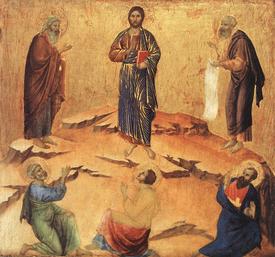 The London Telegraph ran a story about the theologians’ acceptance/approval of the miracle put forward by Cardina John Henry Newman’s postulator. It’s an American helping a Brit. Now the information is on the Pope’s desk. “People” are hoping for a beatification ceremony in the autumn. Deo volente. Read the story here.
The London Telegraph ran a story about the theologians’ acceptance/approval of the miracle put forward by Cardina John Henry Newman’s postulator. It’s an American helping a Brit. Now the information is on the Pope’s desk. “People” are hoping for a beatification ceremony in the autumn. Deo volente. Read the story here.
Tag: John Henry Newman
A Newman anniversary and a new website
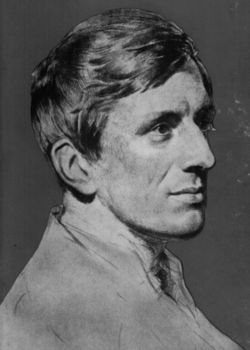 On this day in 1991, Pope John Paul the Great recognized John Henry Cardinal Newman was indeed a man who possessed heroic virtue. This recognition carried with it an ecclesial title of “Venerable Servant of God.” Henceforth, we say “Venerable Servant of God John Henry Newman.”
On this day in 1991, Pope John Paul the Great recognized John Henry Cardinal Newman was indeed a man who possessed heroic virtue. This recognition carried with it an ecclesial title of “Venerable Servant of God.” Henceforth, we say “Venerable Servant of God John Henry Newman.”
The process of determining whether Cardinal Newman is a saint continues along. To assist our understanding of the process of canonization and to have a better appreciation for the great work of Newman, a new website was recently launched. Visit the JHN website here.
Read John Henry Newman one step closer to sainthood
The Prayer for John Henry Newman’s Beatification
God, our father, your servant John Henry Newman upheld the faith by his teaching and example. May his loyalty to Christ and the Church, his love for the Immaculate Mother of God, and his compassion for the perplexed give guidance to Christian people today. We beg you to grant the favors we ask through his intercession so that his holiness may be recognized by all and the Church may proclaim him a Saint. We ask this through Christ our Lord. Amen.
- Church, dogma and certainty
- There is but one rule of faith for all; and it would be a greater difficulty to allow of an uncertain rule of faith, than (if that was the alternative, as it is not), to impose upon uneducated minds a profession which they cannot understand. But it is not the necessary result of unity of profession, nor is it the fact, that the Church imposes dogmatic statements on the interior assent of those who cannot apprehend them. The difficulty is removed by the dogma of the Church’s infallibility, and of the consequent duty of “implicit faith” in her word. The “One Holy Catholic and Apostolic Church” is an article of the Creed, and an article, which, inclusive of her infallibility, all men, high and low, can easily master and accept with a real and operative assent. It stands in the place of all abstruse propositions in a Catholic’s mind, for to believe in her word is virtually to believe in them all. Even what he cannot understand, at least he can believe to be true; and he believes it to be true because he believes in the Church.
- A Grammar of Assent, Garden City, NY: Doubleday Image, 1955 (orig. 1870), p. 129.
What lesson is Cardinal Newman teaching us today?
A few paragraphs of a homily from a Mass at the Birmingham Oratory for transfer of remains of Cardinal Newman
It is surely the lesson the month of November speaks to us about: it is the lesson that our
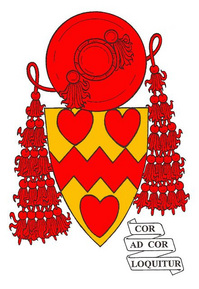 common end, be we who we may, is death and decay and the dissolution of all things. The month begins with All Saints and All Souls: we will all be swept up into that great mass of all the faithful departed, and we hope to become, sooner or later, one with the saints of God. But November ends with the Feast of Christ the King to remind us who it is we must love and serve, to remind us whose is the Kingdom to which we truly belong, to remind us whose gentle and all persuasive rule calls us from the transitoriness of this life to the glory of the life of the Resurrection. That path to the Kingdom is not always easy: as Cardinal Newman himself wrote: “All God’s providences, all God’s dealings with us, all his judgments, mercies, warnings, deliverances, tend to peace and repose as their ultimate issue … after our souls’ anxious travail; after the birth of the spirit; after trial and temptation; after sorrow and pain; after daily dyings to the world; after daily risings unto holiness; at length comes that ‘rest which remaineth unto the people of God’. After the fever; after weariness and sicknesses; fightings and despondings, languor and fretfulness; struggling and failing, struggling and succeeding; after all the changes and chances of this troubled unhealthy state, at length comes death, at length the white throne of God, at length the Beatific Vision.”
common end, be we who we may, is death and decay and the dissolution of all things. The month begins with All Saints and All Souls: we will all be swept up into that great mass of all the faithful departed, and we hope to become, sooner or later, one with the saints of God. But November ends with the Feast of Christ the King to remind us who it is we must love and serve, to remind us whose is the Kingdom to which we truly belong, to remind us whose gentle and all persuasive rule calls us from the transitoriness of this life to the glory of the life of the Resurrection. That path to the Kingdom is not always easy: as Cardinal Newman himself wrote: “All God’s providences, all God’s dealings with us, all his judgments, mercies, warnings, deliverances, tend to peace and repose as their ultimate issue … after our souls’ anxious travail; after the birth of the spirit; after trial and temptation; after sorrow and pain; after daily dyings to the world; after daily risings unto holiness; at length comes that ‘rest which remaineth unto the people of God’. After the fever; after weariness and sicknesses; fightings and despondings, languor and fretfulness; struggling and failing, struggling and succeeding; after all the changes and chances of this troubled unhealthy state, at length comes death, at length the white throne of God, at length the Beatific Vision.”
The lesson we must learn is that, as the Cardinal also said: “He knows what He is about”, and that life’s trials and difficulties, its joys and its beauty all have the object of shaping us to be friends with God, to be at one with Our Lord: this is the aim and purpose of life. That is what John Henry Newman put into practice his whole life-long; it is what he taught others to do, it is what he is calling us to do today.
Cardinal Newman has left us but few earthly remains as focal points for our devotion, as if, and quite explicitly, to point us to that higher goal as a son of St Philip should to lead us away from himself and, as he put it in his hymn to St Philip, “towards the bright palace where our God is present throned in high heaven.” That is what we would want for us as for himself, and the poignancy of his all but empty grave speaks loudly of it.
The Very Reverend Father Paul Chavasse, Provost of the Birmingham Oratory and Postulator for the Cause for the Beatification and Canonisation of the Venerable John Henry Cardinal Newman, delivered this homily on Sunday, November 2, 2008. For the full text see it here.
Newman scholar clarifies questions of Cardinal’s sexuality
Some people would trash even the good name of the dead to get media attention on their agenda. In this case, it seems as though the homosexual lobbyists are trying to make more of a good friendship than what really was there. That is, questions about Cardinal Newman’s sexuality, that he was same sex attracted, are surfacing with the goal of derailing the process of beatification/canonization. London’s Daily Mail published an article questioning the facts and the Catholic News Agency published this article. Father Kerr’s L’Osservatore Romano article follows; it was published today in the weekly English edition.
CARDINAL JOHN HENRY NEWMAN’S EXHUMATION OBJECTORS
Healthy manhood at the service of the Kingdom
Recently various newspapers have published articles on Venerable John Henry Newman, sowing doubts about his sexual inclination. The following is a clarification by Prof. Ian Ker, an eminent Newman scholar and Oxford University Professor.
Professor Ian Ker
Oxford University, England
The exhumation of Venerable John Henry Newman’s body from his grave has led to calls in particular from the homosexual lobby that he should not be separated from his great friend and collaborator Fr Ambrose St John, in whose grave Newman is buried in accordance with his own specific wishes.
The implication of these protests is clear: that Newman wished to be buried with his
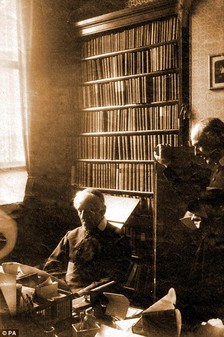 friend because, although no doubt chaste and celibate, nevertheless he had more than simply friendly feelings for St John.
friend because, although no doubt chaste and celibate, nevertheless he had more than simply friendly feelings for St John.
However, if wanting to be buried in the same grave as someone else indicates some kind of sexual love for the other person, then C.S. Lewis’ brother Warnie, who is buried in the same grave in accordance with both brothers’ wishes, must have had incestuous feelings for his brother.
Or again, G.K. Chesterton’s devoted secretary, Dorothy Collins, whom he and his wife regarded as a daughter, while thinking it presumptuous to ask to be buried in the same grave as the Chestertons, nevertheless directed that she be cremated and that her ashes should be buried in the same grave. Does this mean that she had more than filial feelings for one or both of her employers?
Ambrose St John was an extremely close friend of Newman. He had devoted himself for 30 years to the service of Newman, even asking if he might take a vow of obedience to him at his Confirmation, a request that was, of course, refused.
Newman blamed himself for his death, having asked him to translate the German theologian Joseph Fessler’s important book on infallibility in the wake of the First Vatican Council, a last labour of love that had proved too much for him, overworked as he already was.
In his dark last days as an Anglican, Newman said that Ambrose St John had come to him “as Ruth to Naomi”. After joining Newman’s semi-monastic community at Littlemore outside Oxford, he had remained as Newman’s closest supporter all through the difficulties of founding the Oratory of St Philip Neri in England and all through Newman’s many subsequent trials and tribulations as a Catholic.
In his Apologia pro Vita sua, Newman “with great reluctance” mentions that at the time of his first religious conversion when he was 15 he became convinced that “it would be the will of God that I should lead a single life”.
For the next 14 years, “with the break of a month now and then”, and then continuously, he believed that his “calling in life would require such a sacrifice”.
Needless to say, there were no “civil partnerships” between men then in what was still a Christian country where homosexual activity was punishable by imprisonment and was universally regarded as immoral. Newman, of course, is talking about marriage with a woman and the sacrifice that celibacy involved.
The only reason it could have been a sacrifice was because like any normal man Newman wished to get married. But, although not belonging to a church where celibacy was the rule or even the ideal, Newman, steeped in Scripture as he was, knew the words of our Lord: “there are eunuchs who have made themselves that way for the sake of the kingdom of heaven”.
Twenty five years after his youthful embrace of celibacy, we find Newman counting the cost, at the conclusion of the extraordinary account he wrote of his near fatal illness in Sicily in 1833: “The thought keeps pressing on me, while I write this, what am I writing it for?… Whom have I, whom can I have, who would take interest in it?… This is the sort of interest which a wife takes and none but she – it is a woman’s interest – and that interest, so be it, shall never be taken in me…. And therefore I willingly give up the possession of that sympathy, which I feel is not, cannot be, granted to me. Yet, not the less do I feel the need of it”.
In these moving sentences, written while he was still a clergyman of the Church of England and fully entitled to marry, we see Newman’s total commitment to the life of virginity to which he felt unmistakably called, but yet we can also feel the deep pain he experienced in sacrificing the love of a woman in marriage.
Finally, what should be said to those who think Newman’s wishes should be honoured and that Ambrose St John’s remains should be removed with his?
Throughout his life as a Catholic, Newman always insisted that whatever he wrote he wrote under the correction of Holy Mother Church. That was his constant refrain. If the Church decrees that his remains should be removed to a church, then Newman’s undoubted response would be that of his last testament, like everything else he wrote, he wrote under correction of higher authority.
And if that higher authority decrees that his body be removed and that of his friend left, then Newman would say without hesitation, “so be it”.
118 years after the death of John Henry Newman, Venerable Servant of God
Today’s Catholic News Service reports that Cardinal Newman’s body will be moved
LONDON (CNS) — The British government has agreed to allow the exhumation of the
 body of a 19th-century cardinal whose cause for sainthood widely is expected to progress soon to beatification. The Ministry of Justice granted a license to allow undertakers to dig up the body of Cardinal John Henry Newman from a grave in a small cemetery in the suburbs of Birmingham, England, and transfer it to a marble sarcophagus in a church in the city, where it can be venerated by pilgrims. The license was expected to arrive Aug. 11, the 118th anniversary of the cardinal’s death in 1890. Approval had been delayed by several months because of a 19th-century law that forbids the transfer of bodies from graves to church tombs. But Sir Suma Chakrabarti, permanent secretary to the Ministry of Justice, finally decided to make a special exception to allow the exhumation to go ahead. Born in London in 1801, Cardinal Newman was an Anglican priest who led the Oxford movement in the 1830s to draw Anglicans to their Catholic roots. He converted to Catholicism at the age of 44 after a succession of clashes with Anglican bishops made him a virtual outcast from the Church of England.
body of a 19th-century cardinal whose cause for sainthood widely is expected to progress soon to beatification. The Ministry of Justice granted a license to allow undertakers to dig up the body of Cardinal John Henry Newman from a grave in a small cemetery in the suburbs of Birmingham, England, and transfer it to a marble sarcophagus in a church in the city, where it can be venerated by pilgrims. The license was expected to arrive Aug. 11, the 118th anniversary of the cardinal’s death in 1890. Approval had been delayed by several months because of a 19th-century law that forbids the transfer of bodies from graves to church tombs. But Sir Suma Chakrabarti, permanent secretary to the Ministry of Justice, finally decided to make a special exception to allow the exhumation to go ahead. Born in London in 1801, Cardinal Newman was an Anglican priest who led the Oxford movement in the 1830s to draw Anglicans to their Catholic roots. He converted to Catholicism at the age of 44 after a succession of clashes with Anglican bishops made him a virtual outcast from the Church of England.
The Venerable Servant of God John Henry Newman
The Venerable Servant of God John Henry Newman was born in London, 21 February
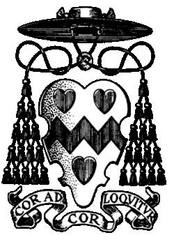 1801, and died Birmingham, 11 August 1890. As Vicar of Saint Mary’s Oxford he exerted a profound spiritual influence on the Church of England. Accepting true faith as professed and taught by the Catholic Church in 1845, he founded Oratories of Saint Philip Neri in Birmingham (1848) and later in London (1849) and was the first rector of the Catholic University in Dublin. Newman was made a Cardinal by Pope Leo XIII in 1879. Through his published writings and private correspondence he created a greater understanding of the Catholic Church and her teachings, helping many persons with their religious difficulties. At his death he was praised for his unworldliness, humility, and prayerful contact with God. Pope John Paul II declared Newman a “Venerable Servant of God” on 22 January 1991. At the 2nd century of the Cardinal’s birth Pope John Paul wrote:
1801, and died Birmingham, 11 August 1890. As Vicar of Saint Mary’s Oxford he exerted a profound spiritual influence on the Church of England. Accepting true faith as professed and taught by the Catholic Church in 1845, he founded Oratories of Saint Philip Neri in Birmingham (1848) and later in London (1849) and was the first rector of the Catholic University in Dublin. Newman was made a Cardinal by Pope Leo XIII in 1879. Through his published writings and private correspondence he created a greater understanding of the Catholic Church and her teachings, helping many persons with their religious difficulties. At his death he was praised for his unworldliness, humility, and prayerful contact with God. Pope John Paul II declared Newman a “Venerable Servant of God” on 22 January 1991. At the 2nd century of the Cardinal’s birth Pope John Paul wrote:
For his [Newman] tomb he chose the inscription: Ex umbris et imaginibus in veritatem; and it was clear at the end of his life’s journey that Christ was the truth he had found. But Newman’s search was shot through with pain. Once he had come to that unshakeable sense of the mission entrusted to him by God, he declared: “Therefore, I will trust Him… If I am in sickness, my sickness may serve Him, in perplexity, my perplexity may serve Him… He does nothing in vain… He may take away my friends. He may throw me among strangers. He may make me feel desolate, make my spirits sink, hide the future from me. Still, He knows what He is about” (Meditations and Devotions). All these trials he knew in his life; but rather than diminish or destroy him they paradoxically strengthened his faith in the God who had called him, and confirmed him in the conviction that God “does nothing in vain”. In the end, therefore, what shines forth in Newman is the mystery of the Lord’s Cross: this was the heart of his mission, the absolute truth which he contemplated, the “kindly light” which led him on.
Prayer for Canonization John Henry Newman
Eternal Father, You led John Henry Newman to follow the kindly light of Truth, and he obediently responded to your heavenly calls at any cost. As writer, preacher, counsellor and educator, as pastor, Oratorian, and servant of the poor he labored to build up your Kingdom.
Grant that through your Vicar on Earth we may hear the words, ‘Well done, thou good and faithful servant, enter into the company of the canonized saints.’
May you manifest your Servant’s power of intercession by even extraordinary answers to the prayers of the faithful throughout the world. We pray particularly for our intentions in his name and in the name of Jesus Christ your Son our Lord. Amen.
This Wondrous Glory
|
Transfiguration |
|
|
|
|
|
For stranger to admire; |
|
A serious aspect, but it burn’d |
|
With no unearthly fire. |
|
|
|
Thy speech was rare and high; |
|
And yet it vex’d my burden’d breast, |
|
And scared, I knew not why. |
|
|
|
On face, and form, and air; |
|
God’s living glory round thee blazed– |
|
A Saint–a Saint was there! |
|
John Henry Newman |
|
|
|
|
|
Lift up your eyes on high, |
|
For there He doth the Sign accord |
|
Of His bright majesty. |
|
|
|
That shall outlive all time, |
|
Older than depth or starry height, |
|
Limitless and sublime. |
|
|
|
And heathen tribes decreed, |
|
The King to Abraham pledged of old |
|
And his unfailing seed. |
|
|
|
And witness’d when He came, |
|
The Father speaks to all the earth |
|
To hear, and own His name. |
|
|
|
To babes His beaming face, |
|
Be, with the Father, endless praise, |
|
And with the Spirit of grace. Amen. |
A Matins Hymn
John Henry Newman
